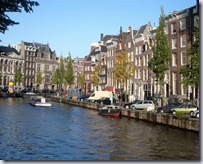 This morning, I caught up on recent blog posts authored by a US-based friend of mine. Although they are a long way from the sights and thoughts found along a later stroll through Amsterdam’s center, they do remind me of the force that Tuesday’s election has back home.
This morning, I caught up on recent blog posts authored by a US-based friend of mine. Although they are a long way from the sights and thoughts found along a later stroll through Amsterdam’s center, they do remind me of the force that Tuesday’s election has back home.
She writes passionately about the upcoming election, feeling their significance and worrying about the potential consequences of an upset. I followed her links to typical Letters to the Editor and agree that it is getting ugly out there (as it is in my home state: the Seattle Times, the Tri-City Herald). It’s easy to get upset at the distortions written and misunderstandings expressed as people try to sway one another’s votes.
At the same time, it’s not something that I can take personally. These voices are out there, and the papers try to reflect that diversity to reflect the national dialog. But in the end, we all get one vote, the country will move on with a popularly elected leader, and we will undertake the serious work of undoing the social, economic, global, and constitutional damage done by the last one.
Truth be told, I’ve actually been encouraged that the press has not focused on the whispered innuendo and biased slogans from either side, and that they have fact-checked statements and contrasted positions to a much greater degree than in the prior decade.
And, in the end, I do trust that centrist people will make a wise choice.
It’s also not so consequential in the long term: the future will turn on larger themes and bigger events than those we are debating today.
Touring the 16th century canal houses and 18th century villas that dot Amsterdam, I’m always struck by how quaint the technologies, fashions, and perspectives of that time are when viewed from our own. Yet they were the height of progress and sophistication in their time, deadly serious for their people.
The message from the US is real enough, and my friend’s reactions are justified. I have similar feelings of sadness and frustration as I follow the McCain / Palin message and messengers.
But I think that in the heat of this moment we can all see events larger than they really are, and credit dissident voices with more influence than they have. I know that sometimes I do.
And I recognize that we all need to keep the longer perspective.
And so, I’ll share a passage from science fiction writer Olaf Stapledon which I used as a preface to my doctoral thesis and which has always been effective at reminding me of that:
Men of your day, when they look back into the history of their planet, remark not only the length of time but also the bewildering acceleration of life’s progress. Almost stationary in the earliest period of the earth’s career, in your moment it seems headlong. Mind in you, it is said, not merely stands higher than ever before in respect of percipience, knowledge, insight, delicacy of admiration, and sanity of will, but also it moves upward century by century ever more swiftly. What next? Surely, you think, there will come a time when there will be no further heights to conquer.
This view is mistaken. You underestimate even the foothills that stand in front of you, and never suspect that far above them, hidden by cloud, rise precipices and snow-fields. The mental and spiritual advances which, in your day, mind in the solar system has still to attempt, are overwhelmingly more complex, more precarious and dangerous, than those which have already been achieved. And though in certain humble respects you have attained full development, the loftier potencies of the spirit in you have not yet even begun to put forth buds.
Last And First Men, Olaf Stapledon, 1930


